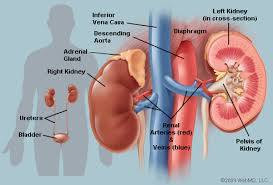The Impact of Stress on Kidney Function and How to Manage It - Hiranandani Hospital Kidney
Stress and Kidney Health: Unveiling the Connection
In the fast-paced world we navigate daily, stress has become an unwelcome companion for many. It weaves its way into our lives through work pressures, personal commitments, and the constant hum of modern living. While stress is often recognized as a mental and emotional burden, it's vital to appreciate that its impact isn't limited to our psychological well-being. It can significantly influence our physical health, including the health of a pair of vital organs that often operate silently—our kidneys.
Nurturing an Understanding of Kidney Function
The kidneys, two bean-shaped powerhouses tucked beneath our ribcage, serve as the unsung heroes of our internal systems. These remarkable organs perform a multitude of crucial tasks, encompassing the filtration of waste and excess fluids from our blood, the regulation of blood pressure, the balance of electrolytes like sodium and potassium, and the production of essential hormones.
When our kidneys operate optimally, our body's internal environment remains in a state of equilibrium. However, it's imperative to recognize that the impact of stress can disrupt this delicate balance.
The Stress-Kidney Connection
Stress is a complex biological response that initiates the 'fight or flight' mechanism in our bodies. This mechanism involves the release of stress hormones, predominantly cortisol and adrenaline. While this response is designed to prepare us to respond to immediate threats, chronic stress can perpetuate the ongoing release of these hormones. This persistent exposure can take a toll on our kidneys.
Elevated Blood Pressure: Prolonged stress can lead to elevated blood pressure. This heightened pressure can harm the small blood vessels in the kidneys, diminishing their ability to filter waste and maintain a stable internal environment.
Inflammation: Chronic stress fosters inflammation throughout the body, potentially causing damage to the intricate structures within the kidneys that facilitate filtration. Inflammation can disrupt the normal functioning of the tiny filtering units within the kidneys, known as glomeruli, and this disruption may result in the presence of excess protein in the urine and possible kidney damage as per Hiranandani Hospital Kidney Transplant department.
Increased Sodium Retention: Stress hormones can prompt the retention of sodium in the body. This sodium retention disrupts the balance of electrolytes and fluids that the kidneys vigilantly manage, putting additional strain on these vital organs.
Reduced Blood Flow: Stress-induced constriction of blood vessels reduces blood flow, affecting the kidneys' ability to function optimally. Decreased blood flow can impair the kidneys' filtration process, leading to difficulties in waste and toxin elimination.
Strategies for Managing Stress and Safeguarding Kidney Health
The recognition of the stress-kidney connection is the first step towards preserving kidney health. The next is adopting effective stress management strategies to mitigate the impact of stress on these vital organs.
Practice Stress-Reduction Techniques: Incorporate stress-reduction techniques into your daily life. Activities like meditation, deep breathing exercises, yoga, and mindfulness can help manage stress by reducing the production of stress hormones. These practices promote relaxation, reduce anxiety, and enhance overall well-being.
Stay Physically Active: Regular physical activity is a powerful tool for reducing stress. Exercise triggers the release of endorphins, the body's natural mood elevators. Engaging in physical activities not only reduces stress but also contributes to overall mental and emotional well-being, says Hiranandani hospital powai news.
Maintain a Healthy Diet: The food you consume plays a significant role in managing stress and maintaining kidney health. Embrace a well-balanced diet rich in fruits, vegetables, whole grains, and lean proteins. Limit your consumption of processed foods, sodium, and caffeine, as these can exacerbate the body's stress response.
Stay Hydrated: Proper hydration is essential for kidney function. Drinking an adequate amount of water helps the kidneys flush out waste and toxins, supporting their role in maintaining overall health. Pay attention to your body's signals for thirst and ensure you consume sufficient water.
Get Quality Sleep: Adequate, restful sleep is a cornerstone of effective stress management. Aim for 7-9 hours of quality sleep each night to allow your body and mind to recharge. Quality sleep is essential for reducing stress and its negative health effects.
Seek Support: Don't bear the burden of stress alone. Seek support from friends, family, or mental health professionals when needed. Talking to someone you trust can provide emotional relief and new perspectives on dealing with life's challenges.
In conclusion, stress is an inescapable aspect of modern life, but its impact on our kidneys is not insurmountable. By implementing stress management strategies and embracing a healthy lifestyle, we can shield our kidney function and overall well-being. Your health is a precious asset, and managing stress is a significant step towards safeguarding it.
At Hiranandani Hospital Kidney, we are deeply committed to holistic well-being, and we stand by your side on the journey to a healthier, stress-free life. Under the guidance of Dr. Sujit Chatterjee, we are dedicated to offering the support and resources you need to lead a life that is both stress-free and kidney-healthy. Your health is our utmost priority, and we are here to empower you to live your healthiest life.



Comments
Post a Comment